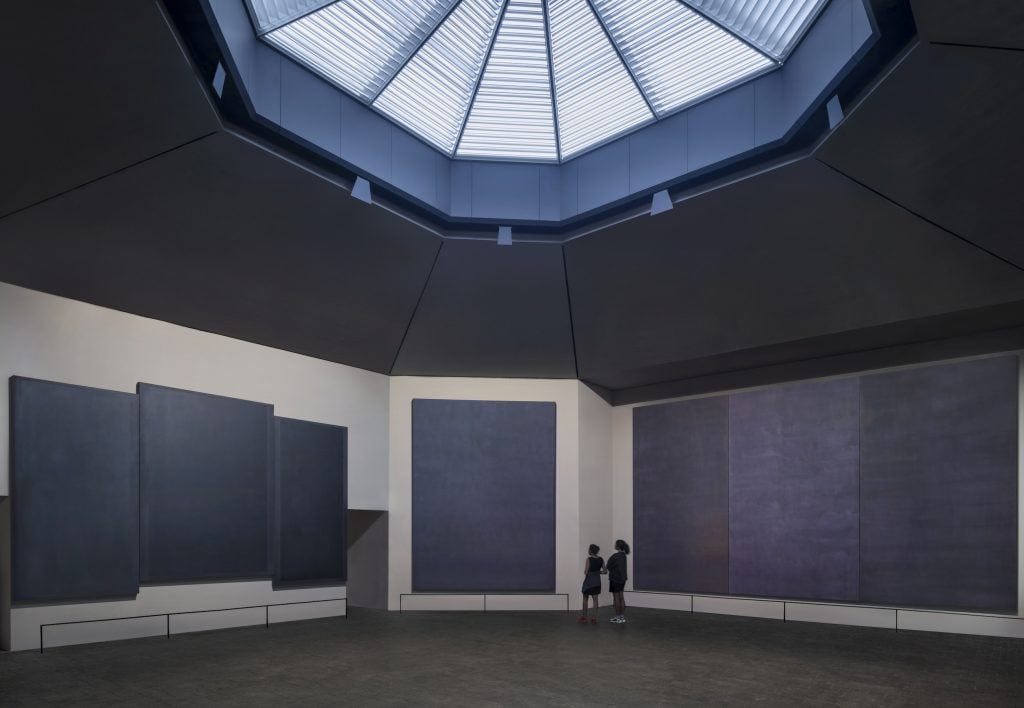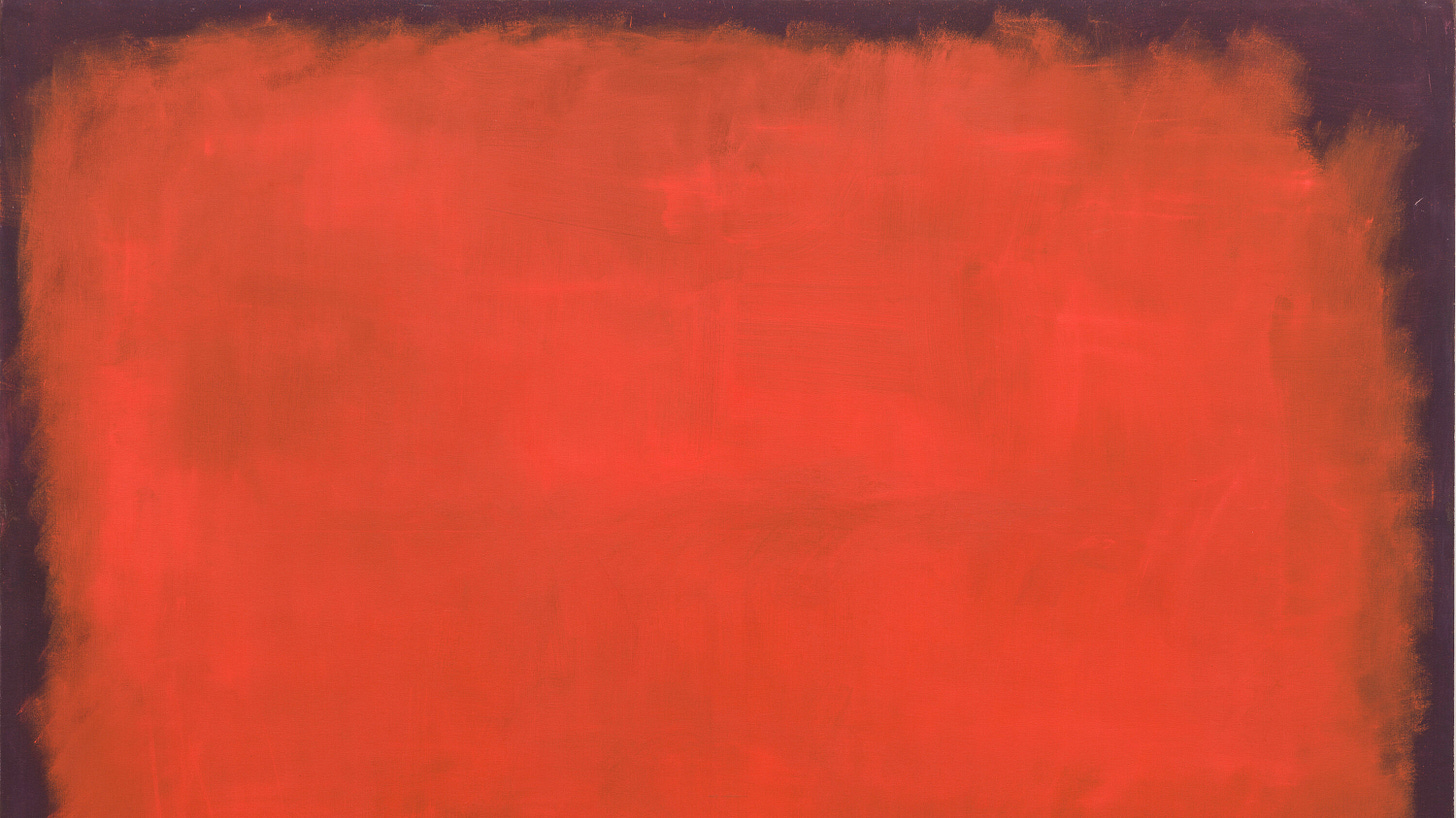I recently attempted to take Camille to the Rothko Chapel in Houston and realized that it closed its doors indefinitely after sustaining damage from Hurricane Beryl. This has ended an accidental tradition: In the last couple of years, lacking any midsummer vacation plans and desperate to escape the Austin heat, I reluctantly wandered to Houston to walk through the large air-conditioned museum spaces. On these ill-planned trips, I eventually ended up at the Rothko Chapel.
The Rothko Chapel is an irregular octagon with three longer sides set deeper than the others. These three long sides contain large rectangular Rothko paintings, while the shorter sides contain more vertical works. The only thing I remember about these paintings is the sensation of calm expanding inside me the longer I stared at the brush strokes that run over one another endlessly, forming a deep blue hue that I've never seen before or after. The chapel is also one of the rare public spaces that I've been to in the United States, where silence is enforced. The silence is all I noticed on my first visit, during a tumultuous period of my life when I did not have much money. The Rothko Chapel is free to walk into, which deserves special mention because looking at art and being in a quiet space generally costs money in this part of the world. Back home, I often visited churches with my mom that provided the same comfort I got on my first visit to the Rothko Chapel.
We went to church only when something terrible had transpired in the prior weeks. More often than not, these visits happened when my father stopped talking to either me or my mom, or both of us, for offenses both actual and hypothetical. There were usually clear signs leading up to my father becoming a Roomba that just moved about the house, making its presence known but not acknowledging the personhood of others. He threw a rage fit, much like a hurricane making landfall, and then once it passed through, everything became quieter than before. It was an exercise of power through withdrawal, which was effective since I was a child dependent on my parents, and my mom happened to be born into a place and time where a middle-aged woman was dependent on male support, regardless of her earning income or not.
It did not matter what denomination of church my mom and I went to. We went to the one that was most convenient to our daily routine, usually mid day when there was no mass. The only other people in the church seemed to be burdened with graver misfortunes than us. We both knelt and said our prayers. The air was solemn, and sometimes my mom cried: we prayed about our problems to someone who would not talk back - shockingly similar to how it was back home. The irony was lost on me back then which is unfortunate cause I could have used a laugh. I felt like a character in a Russian novel during these church visits. Things generally trended upward after because the visit coincided with the nadir of our emotional states.
For the longest time, I was angry at this unique punishment that my father dished out. Recently, I learned that British people have a phrase for when one person or group decides to stop talking to someone, which must mean this is a common occurrence: It's called being sent to Coventry. I don't know what the origin of the term is, and I don't intend to find out. According to Rachel Cusk, Coventry suffered badly in the war: It once had a beautiful cathedral that in 1940 was bombed into non existence. So, in typical Indian fashion, I blame the fate of my helpless younger self on the British now. I should visit Coventry sometime - I'm sure that I'd enjoy it, and it would teach me something about my father, at least more than I'd ever know from himself.
I recently decided to read more about Mark Rothko's work. I did not think about doing this for the longest time because I associated him solely with Houston, which I felt said all that I needed to know. I learned that young Marcus Rothkowitz moved here with his parents when he was 11. I find it quite silly how such a singular shared experience at once made Rothko more endearing and discernible to me. It makes the otherworldliness of Rothko's triangles feel familiar. Art critic John Berger describes Rothko's paintings, his deep blue hues that soothe me, as colors awaiting the creation of the visible world (emphasis mine):
All previous painting - from paleolithic caves to modern abstraction - was a refelection upon, or a game with, the visible as found in the existent visible world. The painted forms and colors were often invented, not simply reproduced, yet they all referred, in some way, to what might be imagined after the experience of looking at the world, the visible world.....Rothko's paintings do, or propose the opposite. They are about colors or light awaiting the creation of the visible world. Their expression is of an intense premonition, as might have occurred in the flash .....
Rothko turned painting inside out because the colours he so laboriously created are waiting to depict things which do not yet exist. And his art is an emigrant art, seeking, as only emigrants do, the unfindable place of origin, the moment before everything began.
Lately, I've found myself enjoying the works of emigrant writers writing about places they are unfamiliar with, different from the place they came from or emigrated to. In Heart of Darkness, Joseph Conrad, a Polish immigrant to Britain, writes about the Congo. The novel famously ends with the lines "The horror..The horror," which was borrowed by Apocalypse Now. W.G Sebald wrote in his native language German, but lived in Britain and Switerzland for large parts of his life. In my favorite work of Sebald, Rings of Saturn, the narrator is out on a walk along the tepid eastern coast of England. The sights and sounds of the English coast are interwoven with myriad digressions (If you can call them that) about the history of Red Herring fishing, the melancholic tale of Empress Dowager Xixi and the child emperor of China, and such. Similarly, V.S Naipaul, a Trinidadian of Indian origin who moved to Britain, indirectly investigates his complicated personal history in Area of Darkness, a seething, funny, and cruel memoir about his visit to India in the 1960s. What they were searching for through their work was perhaps what Rothko depicted - the unfindable place of origin, the moment before everything began.



Sachin- For some reason, this part really stood out for me: “What they were searching for through their work was perhaps what Rothko depicted - the unfindable place of origin, the moment before everything began.” I appreciate this.
Loved this piece, the memories you are writing about and the way you approach them in your writing feel eerily familiar.